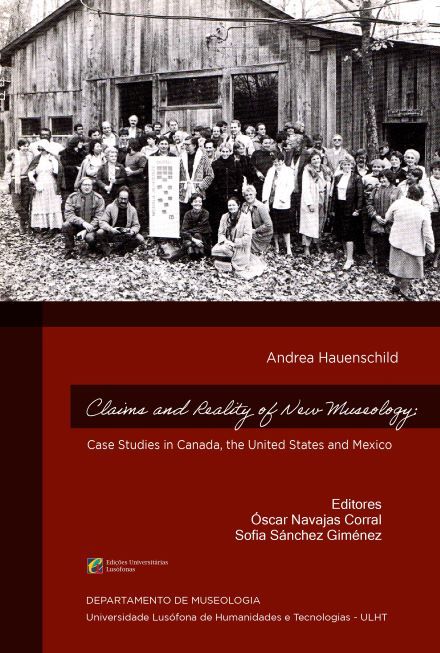2022_Claims and Reality of New Museology: Case Studies in Canada, the United States and Mexico, Andrea Hauenschied
2022
[Editores] Oscar Navajas Corral & Sofía Sánchez Giménez
[Paginação e Design] Maria Helena Catarino Fonseca
[Capa] Maria Helena Catarino Fonseca, Ilustração: I Atelier international- Écomusées/nouvelle muséologie. Haute Beauce, 1984
[Ano de edição] 2022
[Edição] Edicões Universitárias Lusófonas, Campo Grande 376, 1700-090 Lisboa
[Revisão] Giusy Pappalardo
[ISBN] 9798847031035
[DOI] http://doi.org/10.36572/csm.book_07
[Contactos] Departamento de Museologia / Cátedra UNESCO “Educação, Cidadania e Diversidade Cultural” Edifício A. sala A.1.1. email:
FOREWORD TO THE 2022 EDITION
In my work, I like to go back to the source, and I love those moments when we come across historical documents that prefigure, spark or express ideas very similar to those we are developing now, with the sense of breaking new ground... Suddenly we’re not alone anymore. In fact, we’re in good company.
This doctoral dissertation, originally published in 1988, could almost be considered a historical document today. I reread the opening sentence: a 1985 quote from Hugues de Varine on the museum as a perfect tool for social transformation. Decades have since gone by. New museology has become sociomuseology and various other kinds of community- oriented museologies: participative, collaborative, relational, engaged, even activist… And yet the question of the social role of museums is timelier than ever, discussed and debated at all levels of contemporary museum practice.
This dissertation – a critical assessment of the new museology of the 1980s – went through several stages of translation and transposition. It examines and compares different types of people-oriented museums, developed in very different contexts: an “écomusée” in rural Quebec, another in an industrial sector of Montreal, a neighbourhood museum in an African American area of Washington, D.C., and “Casa del Museo” in impoverished Mexican communities. Since I was doing my doctorate in Germany, my task involved translating all this into German, well aware that in the German-speaking sphere, with its long tradition of local and regional museums, one didn’t quite see what was so new about new museology. In the 1990s, the Smithsonian Institution’s Office of Museum Programs commissioned the translation and distribution of the dissertation as a reference tool for the creation of museums as instruments of cultural empowerment in First Nations communities.
Now, in 2021, the Lusophone University in Lisbon is reissuing the text, which, despite being somewhat “over-translated”, remains almost disconcertingly relevant. Of course, I would say some things differently today. Of greatest interest in my view are still the references to the foundational texts of new museology and the excerpts from interviews with those who put the approach into practice and experienced it first- hand. I was twenty-six years old when I began my doctoral research. I have spent my career in Quebec, working in museums and developing theme-based exhibitions for the general public, all the while keeping track of evolutions in socially engaged museology.
For several years now, new museology has, in its current adaptations, experienced a significant revival. In many countries, museums are exploring and practicing participatory museologies in collaboration with their communities. These approaches are part of a great and ongoing societal transformation: the creation of a true cultural democracy based on the principles of equity, diversity and inclusion. Against the backdrop of shifting cultural and power relations, many museums are developing innovative approaches not only to reflect these new realities, but to become agents of change, involved in the construction of new social imaginaries that engage a plurality of voices.
How can museums do more to contribute to social and cultural justice, economic development, individual and collective well-being and a sustainable future? What real impact can they have on individuals and communities? Can they change the world? The questions that have concerned me for so long are as resonant now as they were four decades ago. I hope this text will be “good company” for today’s museum professionals.
With heartfelt thanks to Mario Moutinho, Judith Primo, Sofia Sánchez and Óscar Navajas!
Andrea Hauenschild Montreal, October 13, 2021
Download 2022_Claims and Reality of New Museology: Case Studies in Canada, the United States and Mexico, Andrea Hauenschied

